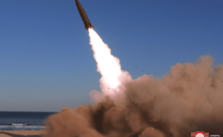This article was initially published by Radio Free Asia and is reproduced here with permission.
On Monday, North Korea launched a suspected mid-range ballistic missile into the sea off its east coast, as reported by South Korea’s military. This incident occurred two weeks prior to the inauguration of U.S. President-elect Donald Trump.
The missile launch coincided with U.S. Secretary of State Antony Blinken’s visit to Seoul, where he was engaged in discussions with the acting president amid ongoing political unrest in South Korea.
According to the South’s Joint Chiefs of Staff (JCS), the missile launch was detected around noon, originating from the Pyongyang area, and it traveled approximately 1,100 kilometers (684 miles) before descending into the sea in under 10 minutes.
The JCS labeled the missile launch a “clear provocation,” indicating that they were monitoring the situation closely and sharing pertinent information with the United States and Japan.
Japan’s Ministry of Defense confirmed the launch, noting that the missile had likely already splashed down in the sea.
Addressing North Korea’s missile and nuclear arms development, which contravenes U.N. resolutions, as well as its antagonistic stance toward the U.S. and its allies, including South Korea, remains a high priority for every U.S. administration.
During his conversations in Seoul with Acting President Choi Sang-mok, Blinken emphasized the “unwavering” commitment of the U.S. to South Korean security, stating that their alliance is more vital than ever.
Trump, set to take office on January 20, previously initiated a groundbreaking diplomatic initiative regarding North Korea during his first term by meeting with leader Kim Jong Un three times. However, these efforts did not yield progress in persuading him to dismantle his nuclear and missile projects.
Trump revived discussions surrounding North Korea during his campaign and has appointed an aide who assisted in planning the summits with Kim, hinting at a possible revival of these efforts.
William Beau Harrison has been designated as an assistant to the president and deputy chief of staff for operations, according to the Trump transition team, which highlighted his “critical” role in organizing the meetings with Kim.
“During President Trump’s first term, Mr. Harrison acted as a liaison between the operational components of the Executive Office of the President, overseeing coordination and execution of all presidential travel, including numerous complex international visits,” the team noted.
“He has taken part in and led several U.S. delegations globally, including in North Korea, Iraq, and Afghanistan, and was instrumental in planning each historic summit with DPRK leader Kim Jong Un,” the team added. DPRK stands for the Democratic People’s Republic of Korea, North Korea’s official designation.
More dialogues ahead?
Trump’s initial meeting with Kim occurred in June 2018 in Singapore, followed by meetings in Hanoi in February 2019, and again at the Demilitarized Zone between North and South Korea in June 2019, where Trump became the first U.S. president to step onto North Korean soil.
Trump aimed to contain North Korea’s nuclear ambitions, while Kim sought to alleviate sanctions and enhance international standing; however, no progress was made towards denuclearization or a meaningful improvement in relations.
Last month, Trump appointed Richard Grenell, a former ambassador to Germany, as his presidential envoy for special missions, stating that his responsibilities would encompass “some of the hottest spots” around the globe, including North Korea.
Additionally, Trump has chosen Alex Wong, who participated in working-level nuclear negotiations with Pyongyang during his first term, as his principal deputy national security adviser.
During his campaign, Trump defended his rapport with North Korea, asserting that “getting along” with Kim was beneficial and suggested that North Korea would not “act out” if he returned to the presidency.
Former Trump adviser Robert O’Brien mentioned to the media in September that Trump might restart talks with North Korea if re-elected but raised doubts about Kim’s willingness to commit to denuclearization.
Meanwhile, Kim seemed to dismiss the possibility of improved ties with the U.S. under the new Trump administration, indicating that past negotiations had only reaffirmed the U.S.’s hostility.
Although Kim did not mention Trump directly, he remarked that, given the U.S. stance towards North Korea, the only viable option is to develop “the most powerful military capabilities,” as reported by North Korean state media in November.

